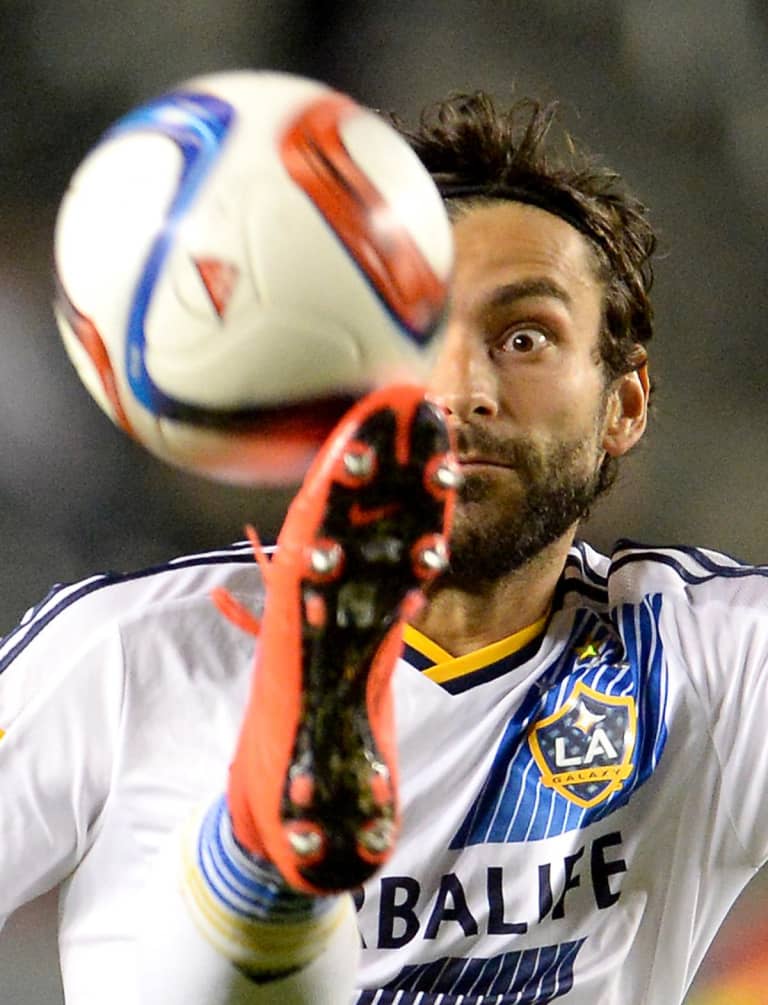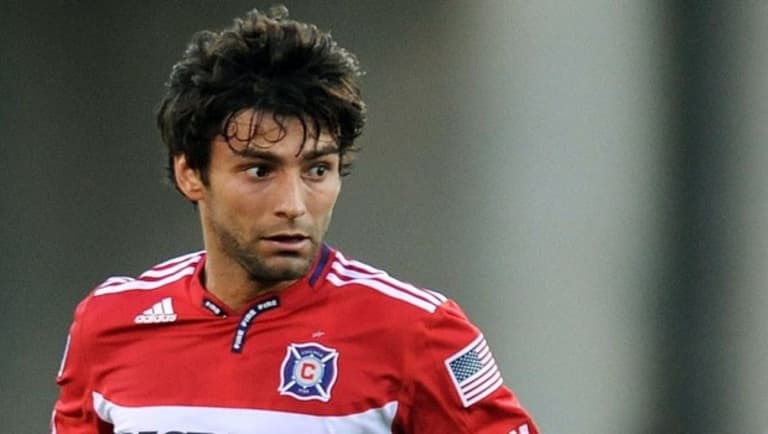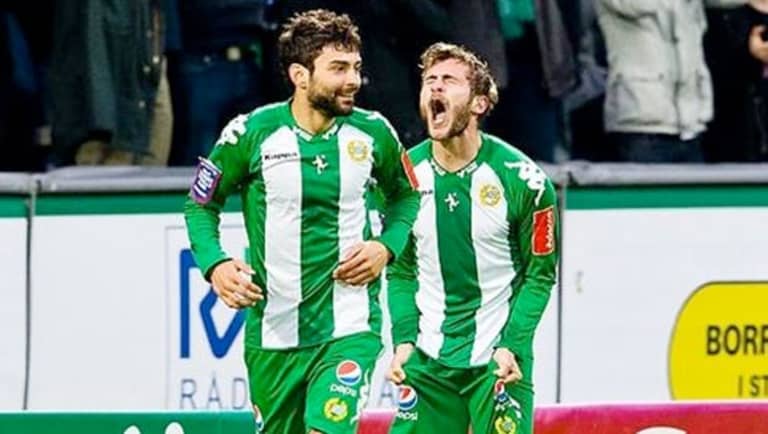CARSON, Calif. – Before he was 10 years old, Baggio Husidic had endured more than most can imagine. The horrors he witnessed during the violent breakup of Yugoslavia in the 1990s not only scarred him, but also molded him into the man he is today. And, in some ways, the soccer player he is today, too.
The LA Galaxy midfielder, a jack of all trades who has played virtually everywhere on the field except in goal during his eight-year professional career, escaped with his family from war-torn Bosnia and Herzegovina, survived a refugee camp and hid in a small bedroom for six months, then withstood nearly daily beatings by classmates after fleeing to Germany.
America was his salvation, though his first impressions of the country on Chicago’s Southside betrayed his visions of a promised land. It was the writings of an unlikely source, Nelson Mandela, that helped provide the inspiration for him to continue to push through it all.
“I read a book of his, and he said a quote in the sense of 'You're never free until you forgive,' ” Husidic says. “He talks about hatred and revenge, and if you have those things in you, you'll never be free from what they did to you, to your family, to the country.
“That touched a good spot for me, and I have that view. There's no hate on my side of it. I'm sad it happened, but it was a [messed]-up war. It was a mass killing of certain religions, and it was bad, and it's sad that things like that are still happening in different parts of the world.”
Husidic, 28, is matter-of-fact on the minutiae, and if it pains him to recite the evils he lived with, in often graphic detail, he never lets on.
“The things he's been through, we joke when he's at our house for dinner,” says Galaxy associate head coach Dave Sarachan, whose son, Ian, became best friends with Husidic when they played together at the University of Illinois-Chicago. “He'll go, 'You know those times when I was dodging landmines,' and we'd laugh and he'd laugh. That stuff is real. These camps he was in, I can only imagine.

“It's survival of the fittest, and that's what makes guys like him sort of grind through things. Because nothing will faze him if that didn't.”
That equilibrium is evident on the field, too. In his play, Husidic never seems to get too high, never too low. He's not rash in his tackles, but not afraid to challenge when necessary. If he is rarely man of the match, he is equally rarely the weak link.
“He's got a calmness about him on the field -- he's very relaxed and never panics in situations,” Galaxy captain Robbie Keane says. “He gets stuck in. He's not a player that lies down very easily. He comes from a tough, tough background, and you can see that in his play.”
---
Adis "Baggio" Husidic was almost destined to be an accomplished soccer player. He was born in 1987 in Velika Kladuša, a town in the northwest part of Bosnia and Herzegovina, on the border with Croatia.
When he was still very young, his father, Zare, dubbed him “Baggio,” after the legendary Italian striker Roberto Baggio. And he quickly grew to love the game at a time when Yugoslavia was one of the most exciting teams in international soccer. They reached the quarterfinals of the 1990 World Cup and had players such as Dejan Savicevic and Robert Prosinečki, who played for AC Milan and Real Madrid.
But the young soccer-loving Baggio didn't have much chance to play once the Bosnian War, one of the ugliest in a series of wars fought as Yugoslavia fell apart in the 1990s, erupted in April 1992, just before his fifth birthday. What first appeared to be a fight over territory soon dissolved into a religious and cultural battle among Orthodox Serbs, Catholic Croats and Muslim Bosnians.
“It was almost a three-way massacre,” Husidic says plainly. “They don't want to say it was a religious cleansing, but it was.”
Husidic and his family – father, mother Mira and older brother Alen – escaped their home for a refugee camp in southeast Croatia when Baggio was 7. His parents and brother did what they could to hide from Baggio the reality of their situation. But they could only hide so much.
“After a while, you figure out what's going on,” Baggio said. "I still remember all the graphic stuff, the destruction and all that. I mean, it's kind of hard not to know.
“It was bad. Body parts. There were mines everywhere – they were using mines during the war, so you'd always hear people stepping on mines. I mean, there were fingers and body parts everywhere all the time. People had their eyes blown out. There were grenade launchers on every corner. I don't know how many grenade launchers I held as a kid. Obviously, they were used. Guns, pistols, thousands of bullets. You name it, I've seen it, so I got accustomed to all that pretty early."
The situation was too dangerous for kids to roam the refugee camp, let alone play soccer, so most of the time was spent in cramped quarters indoors.
“We were, like, 15-16 people in a small, little bedroom,” Baggio said. “You'd wander out, and there wasn't much to do.”
Eventually, Zare was able to bribe a soldier to get his family out of the camp. They went to Split, on Croatia's Adriatic coast, for six months where they “hid inside a bedroom” at a relative's home. It was there that Baggio learned how to lie.
“I think that was probably the hardest part for my family, to teach me how to lie,” he said. “When people ask you where you're from, who you are, you have to tell them lies. Obviously, it's unethical for a parent to teach their kids to lie, so I think it was pretty difficult for them.”
The Husidic family finally escaped from Split and ended up in the suburbs of Hamburg, Germany, in governmental housing, where they would stay for three and a half years, until just before Baggio's 11th birthday.

If it was a relief for the family to leave the Balkan troubles behind them, they found Germany was no paradise.
“Tell you what, that was worse than the refugee camps,” Baggio said. “The amount of hatred that was there and the amount of racism was incredible. Because [I was old enough to] understand. When someone tells you, 'Go back to your country, you're not wanted,' you understand.
“For me that was harder, and three and a half years of it. My parents, I don't know how they did it. I honesty don't know how they did it. They couldn't work. We were on food stamps for three and a half years. You could point us out from a mile away. We had to wear clothes that they provided for us.”
The worst place for Baggio and his brother was at school.
“I was fighting every single day after school. Every single day,” Baggio said. “There wasn't a day that I didn't get my ass kicked or I kicked somebody else's ass. That's how bad it was. That's why I grew a very strong bond with my brother, because we always looked out for each other.”
Baggio and Alen finally found solace where so many children in strife-filled situations do: a soccer field. They joined a team in Uetersen, about 19 miles northwest of Hamburg. It was a multicultural squad, with both Germans and immigrants, and, after years of turmoil, the game finally gave Baggio and his brother a small sense of place.
“That's kind of the first time we felt we belonged a little bit, because you weren't viewed as an immigrant, just as a soccer player,” he said. “That's where I developed good friends that I could hang out with in school. They didn't view me as just one of those Bosnian refugees.”
Soon after, Germany ended its program for the refugees of the Balkan wars. The Husidics had to move again. This time, they won a visa lottery to come to the United States.
“My imagination was running wild when we won that,” Baggio said. “We were living in squalor, and we thought of America: 'Oh, we get to have our own room, our house, both of our parents get to work.' I remember I wanted all the different balls [from American sports], a baseball, football, soccer ball, then all the jerseys.”
The family packed their lives into two big suitcases, and on the train to Frankfurt, for the flight to Chicago, Baggio wore a San Francisco 49ers hat, which he still owns. He vividly remembers an exchange on that train.
“This lady, in her mid-30s, a German woman, sat down next to us and said, 'Oh, you going on vacation?' And my mom said, 'No, we're moving to America.' And [the woman] was like, 'Really? Why?' And my dad said, 'We're going to start a new life.' And the lady started crying. It was crazy. It touched her so much, and she's like, 'For you to do that with two young kids, I've had a [bad] life and I've been too afraid to change it, but I'm going to do the same thing. I'm going to start a new life.' ”
That new life in Chicago wasn't quite what the Husidices were expecting. Again, they found themselves in government housing, on the South Side of the city.
“I woke up really early [the first morning in the apartment], and all I could see were railroad tracks,” Baggio said. “My image of America changed so quickly. How the [hell] are we supposed to have a life here?”
His parents were accountants, but that didn't mean a thing in the new land. His father got a job in construction after a few months, during a boom time, and Baggio and Alen discovered nearby Lake Michigan, where all the kids were hanging out for summer, and “spent a lot of time playing soccer tennis on this basketball court.”
At the time, the Husidices spoke Bosnian in the home, but Baggio and Alen spoke to each other in German. Baggio says he knew one phrase in English: “F--- you.” When they discovered there was a soccer club nearby called Schwaben Athletic Club, they thought it would be a perfect fit.
“We thought everybody was going to speak German, and we'd be able to speak German with them,” Baggio said. “But it was as American as you can get.”
They would take about a year to become fluent in English.
Things got better. Zare made good money in construction, Mira found a job in a medical office, and they moved to bigger and better digs, finally settling in northern suburban Libertyville.

“It's a cool story, if you think about it,” Baggio said. “We started in government housing, then moved to a one-bedroom house in a bad neighborhood, then to a one-bedroom house in a decent neighborhood, a two-bedroom house in the same neighborhood, a three-bedroom house in a really nice neighborhood and then a big, beautiful house with six bedrooms six, seven, eight years later.”
Baggio and Alen played soccer, of course, but Baggio says he “was actually pretty terrible. I didn't really get good until I was 16” and they'd joined storied Sockers FC, which has produced scores of other pro players, including Michael Bradley, Mike Magee and Will Johnson.
“I came off the bench the whole year [after joining the club], and then the next year I was a starter and just climbed past everybody,” Baggio said. “I was a hard worker back then – I still am – but I was really a gym junkie, a gym rat. Spent all my time there. We didn't have much money, so I'd work out there, hang out there.”
Sarachan, then coaching with the Chicago Fire, first saw Husidic around this time. His son, Ian, played at a rival high school, and the Husidic brothers were “street-fighting dudes” on the soccer field.
“Baggio had a certain style and savvy about him. Nothing fazed him,” Dave Sarachan said. “He was technically good. He's not the most athletic guy, but he's got a real intelligence that stands out. He was in a good environment with the Sockers, and the culture there probably gave him real incentive that, 'Hey, I can go further.' ”
Baggio starred at UIC, signed a Generation adidas contract following his junior year, and spent three seasons with the Chicago Fire before leaving for Sweden following the 2011 season, joining Hammarby.

While playing for Hammarby (
pictured at right
), he and his fiancee, Kathleen Fahey, visited his grandmother in his old hometown. It was the first time he'd been there since he was seven.
“It's normal now,” Baggio said. “Obviously, it's going to take many, many years – a generation – to get it where it needs to be, but it's still home, it's still beautiful. ... To be honest, I only remember it in a peaceful way. I was so young, I still think of it as a place I had freedom to roam.
“It was much harder on my parents. My dad lost his brother during the war. That's why I say for me, when we talk about forgiveness, I can't say the same for my parents. My parents left behind a wonderful life. I can't imagine how they felt getting out of there.
“It's hard to explain to people. I don't hate Serbians. I don't hate Croatians. I love all people. A person is not born hating someone or hating [something]. ... And my story was difficult, but I knew friends that had it way worse. I had a buddy whose dad got murdered right behind him, like six yards behind him, while they were walking. Terrible. ...
“So, yeah, my story was tough, and for any American looking at it, they're like, 'Oh, that's so scary, that's sad,' but there's s--t going on in Africa, the Middle East, different areas. [What I went through] is really nothing. It's better to look at the bigger picture.”













